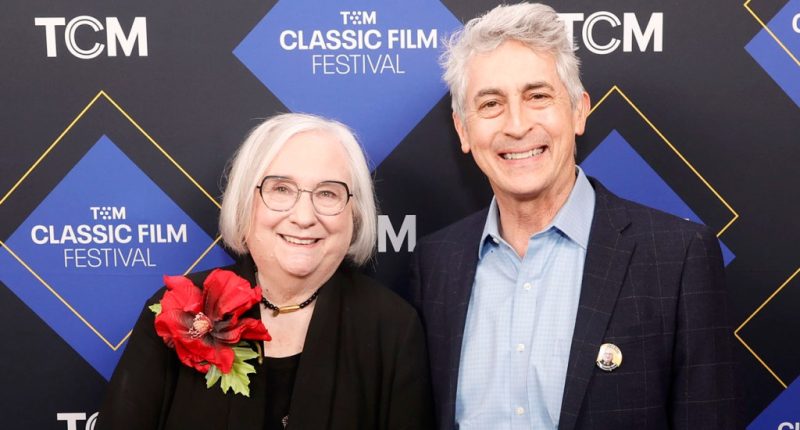On the heels of The Holdovers, two-time Oscar winner Alexander Payne has found his next project — and it will mark the esteemed filmmaker’s documentary directorial debut, The Hollywood Reporter has learned.
Payne is currently in production on — and targeting a 2025 release for — a documentary feature about the trailblazing film scholar Jeanine Basinger, tracing her story from her days as a movie theater usher in Brookings, South Dakota, to Connecticut’s Wesleyan University. Throughout her 60-year career, she built from scratch one of the nation’s first and finest film studies programs; authored 13 highly influential books about film, including two that recently made THR’s list of the 100 greatest of all time; and shaped generations of people who, in turn, have shaped every segment of the American film industry.
Sam Wasson, a former student of Basinger’s at Wesleyan and an esteemed writer who was her co-author of the 2022 book Hollywood: The Oral History, and Brandon Millan, Wasson’s partner in Felix Farmer Productions, are producing the project. (Their publishing shingle, Felix Farmer Press, is also set to release an updated version of Basinger’s classic 1994 book American Cinema under the new title I, The Audience.) They tell THR, “We are so excited to help the greatest filmmaker of his generation tell the story of the greatest film historian of hers.”
Basinger, 88, who appeared on a recent episode of THR’s Awards Chatter podcast, tells the publication, “When it really matters, a midwesterner chooses another midwesterner. We grow up under an open and merciless sky — no place to hide — so we know how to stand up and do the job. Alexander is my Nebraska buddy, the best student I never taught, a long-time cherished friend and a great filmmaker. Who else would I choose?”
The special relationship shared by Basinger and Payne was on display last Saturday when Payne helped to honor Basinger at the TCM Classic Film Festival in Hollywood, where she was feted with the fest’s Robert Osborne Award. The honor recognizes “an individual who has helped keep the cultural heritage of classic film alive for future generations.”
Payne’s full remarks appear below.
Speaking publicly about Jeanine is at once the easiest thing to do and the hardest thing to do. It’s easy because so much seeming hyperbole springs easily to mind, and difficult because so much seeming hyperbole springs so easily to mind — and if there’s one thing we midwesterners don’t like, it’s hyperbole. In fact, pretty much the only thing we allow ourselves to be proud of and brag about constantly is our modesty. But of all the great people I’ve been lucky enough to know during this brief flash of life, Jeanine Basinger is genuinely worthy of hyperbole for her life; for her brain and how she uses it; for her beautiful spirit, her generosity, her accomplishments; and for the enormous community of people she has built, whose lives she has touched, and who in turn touch one another’s.
And why have I been given the honor of speaking about Jeanine on this solemn occasion? It’s because she says I’m her favorite student that she never had. I didn’t go to Wesleyan. And I would say she’s my favorite teacher that I never had, except it’s not true. She is my teacher. She is all of our teacher.
Everybody here probably knows the story. It was referred to in the video [that played just before Payne’s speech], but it’s worth repeating briefly. Jeanine is from Brookings, South Dakota, and as a tot in the late 1930s, she fell in love with the movies. She was blessed with great parents who indulged their daughter’s passion to see everything that played at Brookings’ two movie theaters, one right across the street from each other. As soon as she was barely old enough, she got a job as an usher — you saw it in the video — at both theaters. They were owned by the same guy. And she kept that job into high school, and then through college — Brookings is a college town — and then through graduate school. And it was this experience as an usher, absorbing the same movies over and over again as a fan, and always with an audience, that formed the bedrock of her film knowledge and led her to begin to piece together for herself, as an utterly solitary autodidact, what a movie is and what makes a movie great.
Once bored with the plot itself, the young usher would tell herself, “Well, next time, I’m going to pay attention to the furniture and the costumes.” And the next time, “Well, now I’m going to notice when the music starts and stops.” Ignorant of the word “cut,” she counted blinks, as she called them, and she’d ask herself, “Well, why does one movie 90 minutes long have 68 blinks and another movie the same length have 137?” Perhaps most significantly, she started noticing the names of the directors, always the last credit, and to make the connection that she’d usually like a movie if So-and-So were listed as the director.
She also read all the fan magazines and, eventually, every movie book she could get her hands on, building for herself the beginnings of a complete foundation in the industry of Hollywood. Ask her today about almost any American movie, and she can tell you not just all about it, but the world of it, how it was made, where the players were in their careers, how it was sold and how it was reviewed. So during that exact same decade the Caheirs du Cinema crowd in Paris were smoking their Gauloises and spearheading the auteur theory and, in New York City, Andrew Sarris was sharpening his pencils, a young lady in Brookings, South Dakota, was also inventing the auteur theory, all by her lonesome.
I’ve been lucky enough to meet some of the people who have probably known more about cinema than anyone else who’s ever lived, Bertrand Tavernier, Leonard [Maltin], Martin Scorsese, Pierre Rissient, but then there’s Jeanine in a class by herself. I asked her once whether it’s true what they say about her, that she’s seen every single American movie ever made, including, by the way, short subjects, cartoons, travelogues and newsreels. And she said, “No.” She said, “Not every movie ever made in America.” But, she said, “I’ve probably seen more than anybody else,” which she continues to do to today, even all the new releases. You know all those screeners we get in the fall, all those movies we’ve never even heard of? She actually watches them. Well, a lot of them. And in the words of our mutual friend, Sammy Wasson, “Her love of the medium is so complete that she won’t abandon it even in its most impoverished form.”
I don’t have to go into the massive details about her career. It was described in the video. But all I can say is what we all know: that Jeanine Basinger is a supernova in the firmament of cinema; that her brilliant brain could have led her to the top of any profession, any discipline; that we are so lucky that she chose movies; that when she teaches us movies, she’s also teaching us life and ethics and strength; and that she’s the greatest intellectual we’ll ever meet, but is not an elitist.
With movies, what she teaches us most is to trust ourselves and to trust our own taste. And now that she’s retired, we film lovers really must carry on her legacy as best we can in the ways that she’s taught us. She is not just the finest film professor in the world, but really one of the finest human beings in the world. It’s a pleasure to know you, Jeanine.
Also Read More: World News | Entertainment News | Celebrity News









